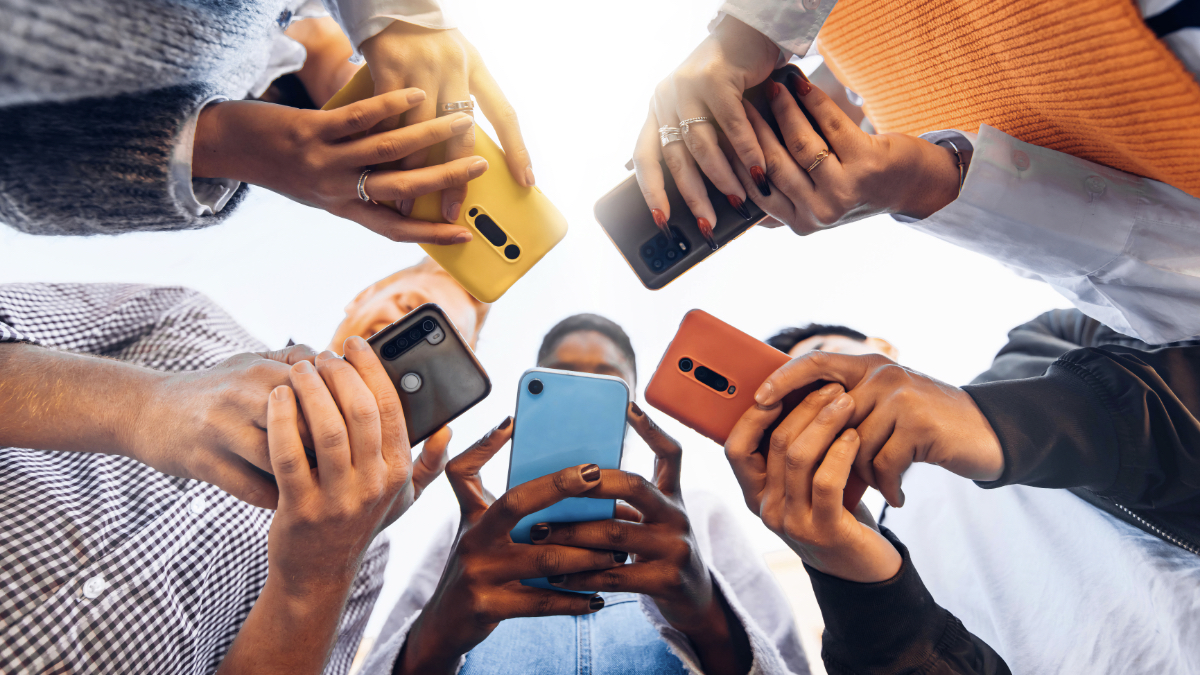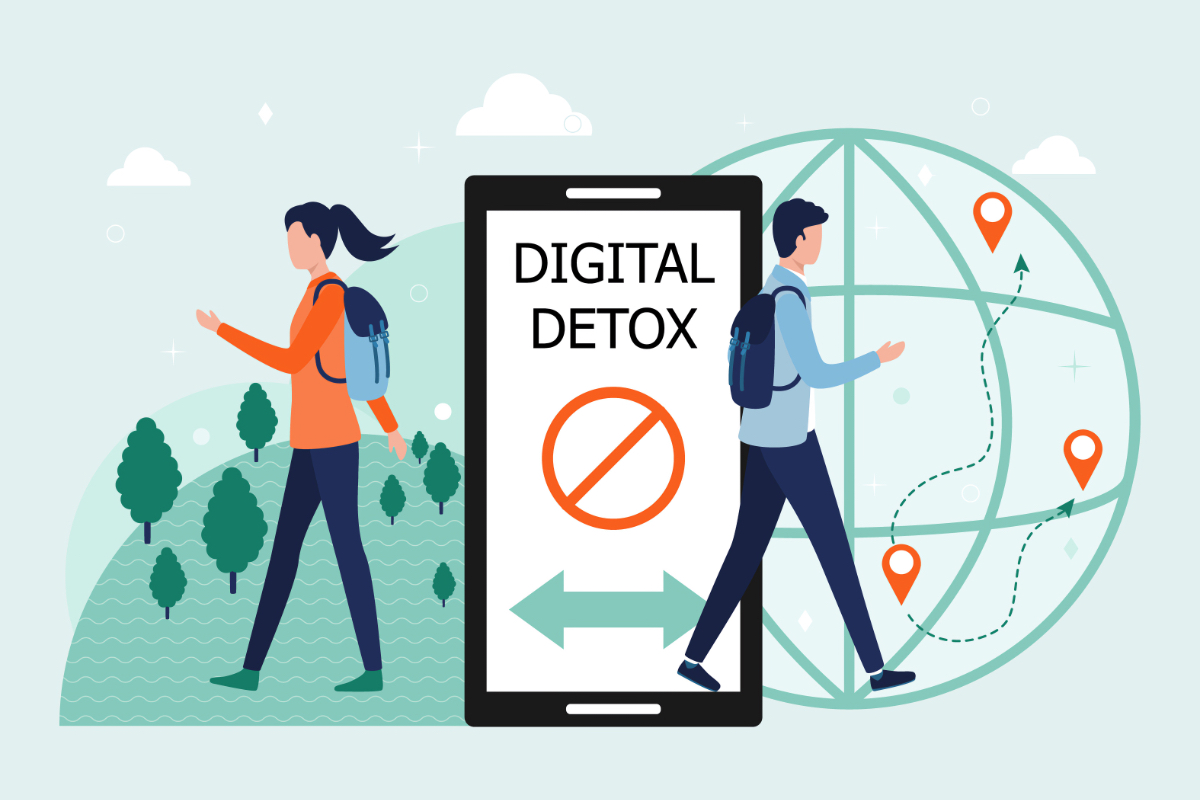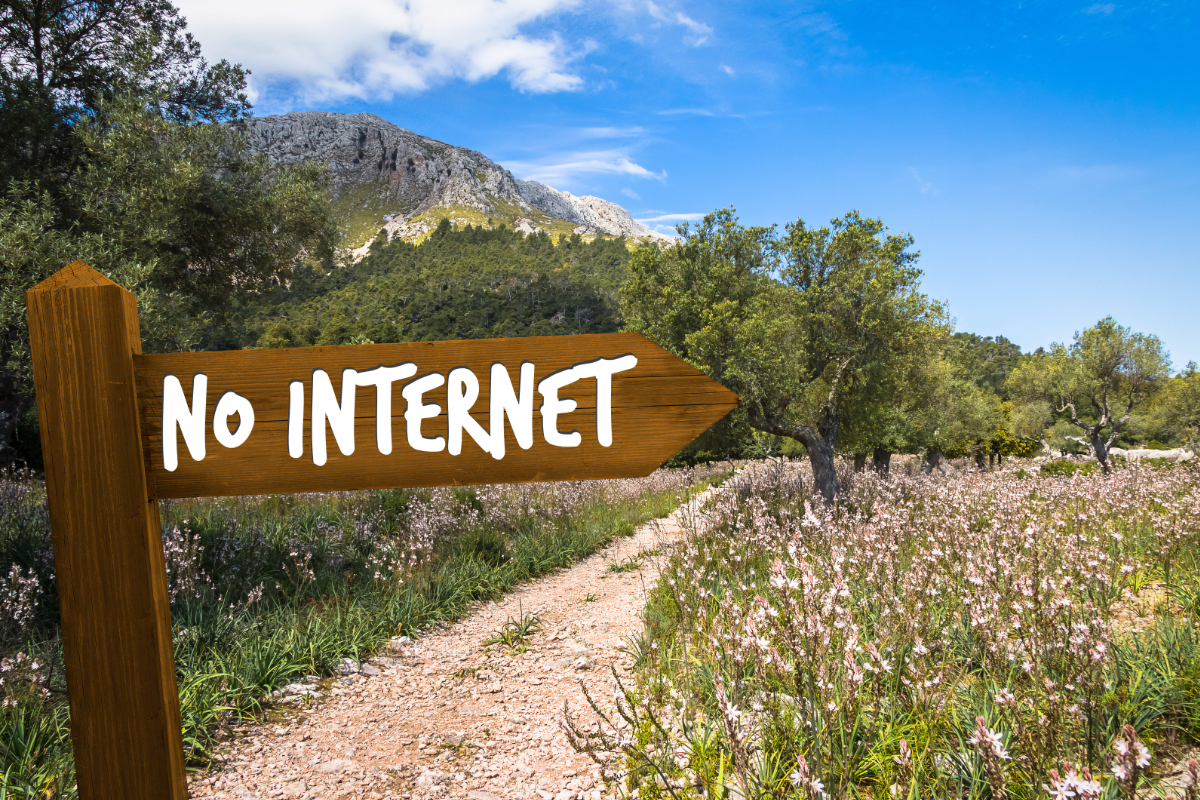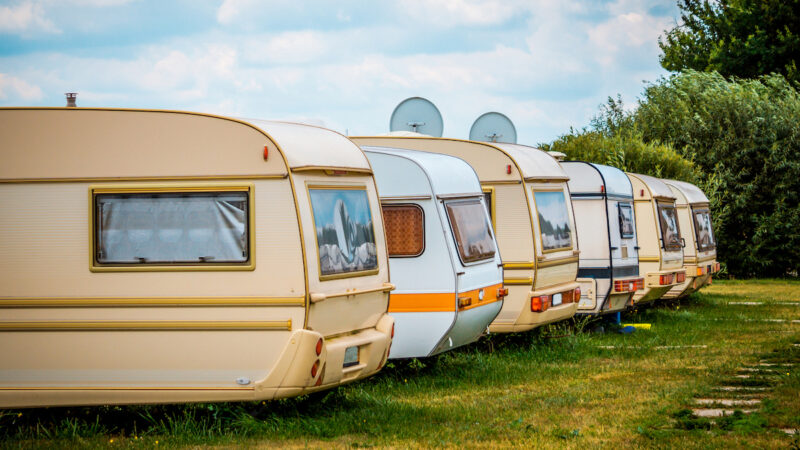Why Your Next RV Trip Should be a Digital Detox
Throughout the day, we’re constantly bombarded by electronic distractions. And these interruptions – dings, chimes, alerts, buzzes – are all tied to events that can trigger strong responses from our bodies and minds, including anxiety, depression, and frustration, just to name a few.
If you’ve experienced a reaction to the alerts on your phone, you’re not alone. More than half of American office workers reported experiencing digital fatigue, according to a 2019 study. So is the solution to throw out our phones, tablets, and computers? Probably not. After all, these devices can often be life-saving (or at least extremely handy when your RV gets a flat and you need a tow.)
As with almost anything, moderation is key. But if you’re struggling to put the phone down, a “digital detox” just might be in order, and a screen-free RV trip could be the antidote you need.
Though you don’t need an RV to do a digital detox, many people who have struggled with depression and anxiety say they felt their mental and physical health improve after spending more time in nature. On top of that, multiple studies cited by the American Psychological Association show that getting outdoors leads to calmer brain waves and less cortisol (stress hormone) in our bodies, not to mention improved memory and attention to detail.

Photo Credit: Kar-Tr/Getty
How Bad is Our Device Addiction?
“When using social media, our brain can become psychologically addicted,” says Jack Hazan, a licensed mental health and addiction counselor and owner of Modern Therapy Group. “This happens when dopamine, the brain’s reward system, is triggered. For example, posting a picture on Instagram and seeing the likes increase creates a loop in our brains. It feels good to receive a lot of likes, so this increases the need for stimulating dopamine production.
“Additionally, we become attached to our devices because of how apps are designed. As a strategy by designers, advertisements and other forms of stimulation look appealing to use and when using them, it brings us validation.”
The data is worrisome. According to one study, high-use teenagers (those who spend seven or more hours in front of a screen) were more than twice as likely to be diagnosed with depression or anxiety as those who spend an hour or less per day on their devices. Those same kids also showed less curiosity, self-control, and emotional stability.
Older folks don’t fare any better. In addition to depression, adults who spent multiple hours in front of a screen suffered from higher rates of obesity, sleep problems, and chronic neck and back pain. Addiction to digital devices may also affect our brains in other negative ways – like impacting long-term memory, attention span, and the ability to be present and aware in a moment.
Zach Lazzari and Kip Tew remember a time when their lives didn’t revolve around their digital devices, but these days, they both admit getting email anxiety if they don’t constantly check their phones. Tew, an attorney and lobbyist, estimates he not only spends more than 10 hours a day tethered to technology but also must remain accessible via his cellphone or laptop even after business hours.
“My clients and coworkers can be very demanding, and the expectation is that I should be available 16-18 hours a day,” Tew says. “If I don’t respond immediately, I feel like I’m not doing my job and fulfilling expectations, so I experience anxiety.”

Photo Credit: limeart/Getty
Digital Detoxing
What’s the solution? Many experts suggest taking a break from technology to reset your mind. This digital detox can take many different forms, from merely limiting your smartphone usage at home to taking a road trip in your RV.
So how do you get started?
“For those who are really attached to their devices, it’s better to ease into a detox than restricting use completely,” Hazan says. “Ultimately, you want to set yourself up for success.”
Before doing a complete digital detox, Hazan recommends turning off your devices’ sound notifications and limiting access to your phone. Start by putting your phone in another room for 15 minutes, then stretch it to 30 minutes, and so on. You can also set up a healthy reward system. Don’t look at your phone for an hour. Go on a short hike, leaving your phone behind.
“This can help you connect with your environment, as well as clarify your thoughts of the day’s events,” Hazan says.
If you’re on a road trip in your RV, you can tell yourself, “I’m not going to go on Instagram for the next two hours” or “I’m going to take one quick photo of this sunset, then I’m going to put my phone away for the rest of the evening” and stick with it.

Photo Credit: JM_Image_Factory/Getty
What Campers Say About Their Digital Detox Trips
Ultimately, taking a total break from technology can be best. Consider it a brain reset. When Lazarri had the opportunity to go on a trip with little-to-no access to technology for most of January 2023, he leaped at it.
“I knew ahead of time that it would be a trip without service and was excited to cut myself off my devices,” Lazzari says. “I need a reason to disconnect from my devices – my camera being the exception.”
Likewise, Tew, who spent five days in eastern Oregon’s Wallowa mountains with no cell signal, calls his break from technology “glorious.”
“I knew I wouldn’t have a signal, and while I was worried about communicating with my family, I was really looking forward to cutting myself off from news and social media for several days,” Tew says.
“What stood out to me was how nice it was to disconnect. We spent most days hiking in high elevation, then just hanging out and talking. I couldn’t work, so I read for pleasure. In five days, I finished several books.”
Most people can feel the benefits of a digital detox within days.
“It took a few days to stop with the physical impulse to reach for my phone,” Lazzari says. “After a week, I was sleeping amazingly well, and all my anxiety subsided around the 10-day mark. I was working like crazy before the trip, and my vision was strained. My eyes seemed to train back to normal [after about a week] as well.”
Experts suggest both adults and children should spend at least three to four hours each day completely detached from digital devices. Young people showing depressive symptoms who reduced their social media use to just 30 minutes per day for three weeks saw a decrease in symptoms, according to a study.
But detoxing at a remote campground with no cell signal is relatively easy. Many RVers, particularly those with families, may not be comfortable being entirely without service in case an emergency arises. Luckily, those RVers still have options.
In some campgrounds, cell reception can change from site to site. If you have your choice of locations, purposely pick the one with the worst coverage. That way, you won’t be able to mindlessly scroll the internet while lounging around your campsite, but if an emergency does come up, you can take a short walk and call for help.
If your campground has poor connectivity, you can turn the situation into a fun, collaborative challenge for the whole family. See who can go the longest without picking up their device. Set rules about when, where, and how long you can use your phone. The lack of reliable internet service can make it easier to detox.
Additionally, instead of bringing your cellphone with you on a hike, pack a device like an actual camera and a Garmin InReach, allowing you to call for help but not change your Facebook status. If you absolutely must carry a phone, pack it away in your backpack, so it’s not easily accessible. (If you’re like me and rely heavily on the AllTrails app, be sure to carry a paper map and compass instead.)

Photo Credit: Maryna Andriichenko/Getty
Digital Detox Aftermath
So what happens when your phone starts to ping with notifications once again?
“Not slipping back into the same addictive habits can be difficult,” Lazzari says. “The first week was great; I was able to work and stay pretty focused. But by week two, I really had to set boundaries to make hard stops on work times. I’m shutting off my phone in the evening now and it’s helping (curb those impulses). … I’m working on a plan to limit online work to 10 hours a week so I’m not burning out on these stupid screens.”
Keeping a recurring weekend on the calendar open for an RV trip free from digital devices could also help regulate and balance your relationship with your gadgets.
Hazan and other experts agree that limiting your device use and shutting off your phone at night can help keep you on track. Don’t trust yourself to curb your social media time? Smartphone manufacturers allow you to restrict the time you spend on certain apps. You just need enough willpower not to disable the feature after the first few days.
Experts also suggest substituting a healthier activity like yoga or hiking whenever you feel like checking your social media. Better still, take an entire day each week to go completely tech-free.
If your tech addictions revolve around work, you should realize that most clients don’t expect a response to their email within seconds. Most business experts say responding within 24-48 hours is more than reasonable for most messages.
One of Hazan’s most important rules is not to bring your devices to bed; your mind needs time to unwind naturally and not be overly stimulated as you try to fall asleep.
Digital devices can be wonderous; the smartphone in your hand contains nearly all of human knowledge and experience. A digital detox and the ensuing change of mindset that comes with it can soon have you using these devices for their intended purpose – reserving and getting directions to your next campground.
The post Why Your Next RV Trip Should be a Digital Detox appeared first on RV.com.
Source: https://www.rv.com/lifestyle-travel/why-your-next-rv-trip-should-be-a-digital-detox/






